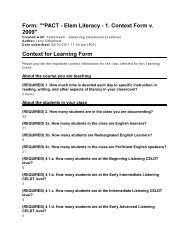The Tutoring Book - California State University, Sacramento
The Tutoring Book - California State University, Sacramento
The Tutoring Book - California State University, Sacramento
You also want an ePaper? Increase the reach of your titles
YUMPU automatically turns print PDFs into web optimized ePapers that Google loves.
grade, to allow them to discover and notice their own repetitive mistakes, without providing editorial<br />
focus.<br />
Yet, in direct contrast with this point, Elizabeth H. Boquet suggests that,”by attempting to have<br />
them figure it our for themselves, I end up feeling as though I’ve perpetuated the very notion that I am<br />
attempting to dispel—that there is a body of knowledge ‘out there’ that some people have access to and<br />
other people do not” (Boquet 118). Boquet seems to think that it’s okay to supply the edit for student<br />
writers; indeed, that a tutor withholding such critiques is a figurative “hoarder of knowledge,” leaving the<br />
student writer in the dark.<br />
We see two opposite perspectives here: one in favor of an explorative, non-product focused<br />
tutoring session and the other for a more directive, editorial tutoring session, focused upon improving the<br />
final product. Yet we’re no closer to a final answer—is focusing on improving the grades of student<br />
writers wrong?<br />
Ultimately, I believe the only viable approach is a compromise between the two. If our student<br />
writers come in seeking to improve their grades, it would be wrong to steer them away from this point.<br />
<strong>The</strong> focus of each tutoring session should always come from the student writer. In the case of my<br />
students, they reported that their grades were improving, and that they were pleased with this<br />
improvement. Though I hinted at the fact that they were still frequently repeating similar mistakes, my<br />
student writers were not daunted. Understanding writing to be a process; it would be unfair of me to<br />
expect my student writers to immediately improve in such areas. It’s okay if they are still making<br />
mistakes; their interest in improving is more important.<br />
Further, whether we agree with it or not, higher grades are interpreted as a sign of success within<br />
our academic setting. By helping to improve their grades, we are simultaneously helping them to excell<br />
within their academic setting. Indeed, it seems a litle unrealistic to completely disregard grading systems<br />
in the way that North promotes. Ultimately, grades are a very influential factor on students, and we should<br />
be willing to address grading concerns within the writing center.<br />
132

















